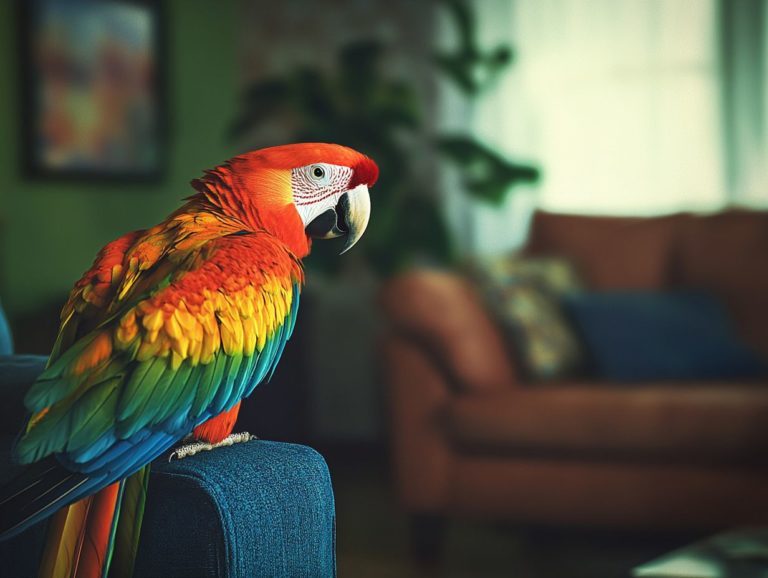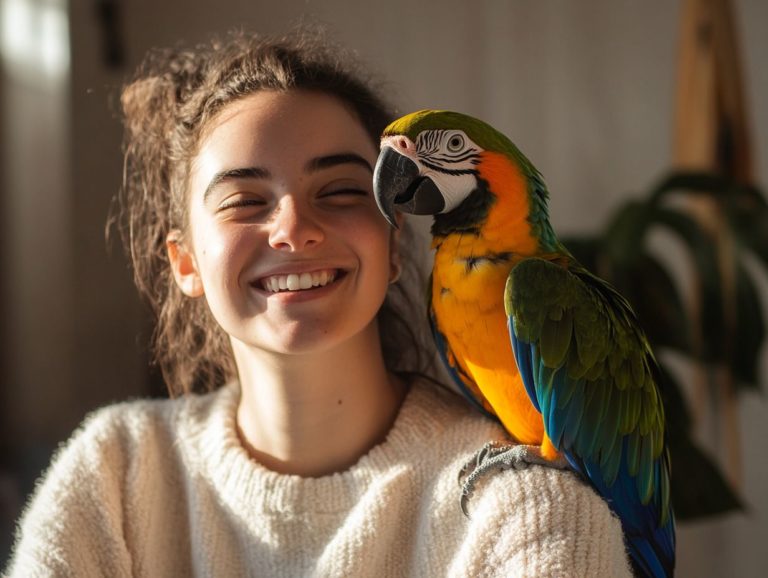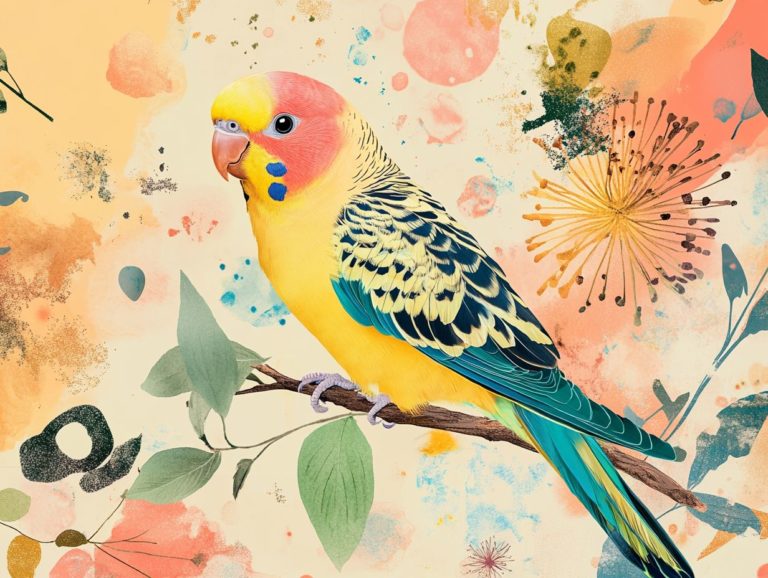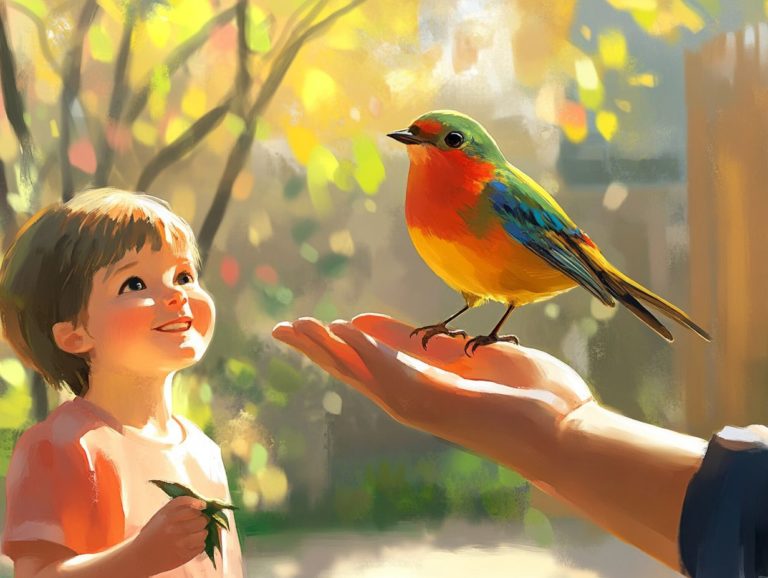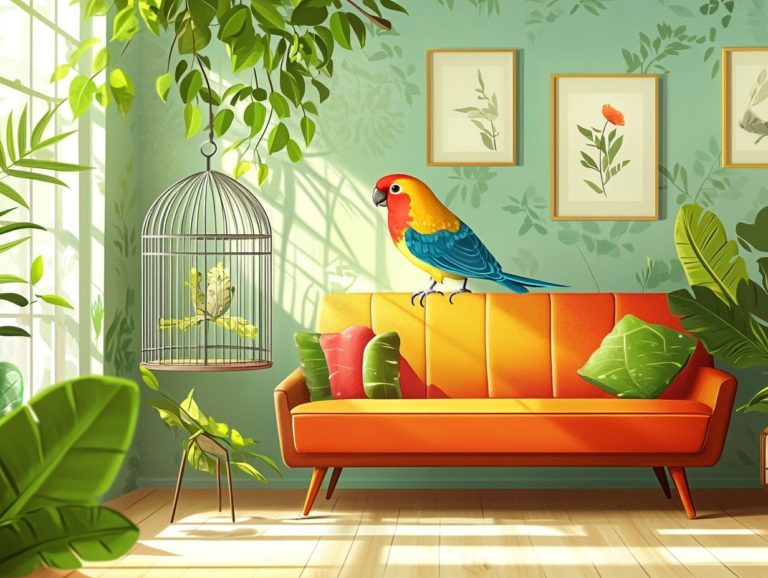How Much Sleep Do Pet Birds Need?
Sleep is crucial for your pet birds’ health and well-being. This is especially true for parrots. Just like you, these avian companions thrive on a consistent sleep schedule to keep their body and behavior in top shape.
Each species, from African Grey Parrots to Cockatoos, has distinct sleep needs and patterns that are vital for their health. Research has indicated that uninterrupted sleep bolsters their resilience against stress and health issues, making it a fundamental aspect of their daily routine.
The way your parrots behave during sleep can vary greatly due to factors like environmental conditions and social interactions, highlighting the importance of creating a suitable resting environment for them.
Contents
- How Much Sleep Do Pet Birds Need?
- Key Takeaways:
- Signs of Sleep Deprivation in Pet Birds
- Creating a Suitable Sleeping Environment
- Common Sleep Problems in Pet Birds
- Frequently Asked Questions
- How Much Sleep Do Pet Birds Need?
- Do Pet Birds Need to Sleep in Complete Darkness?
- Can Pet Birds Take Naps During the Day?
- What Happens if Pet Birds Don’t Get Enough Sleep?
- How Can I Tell if My Bird is Getting Enough Sleep?
- Should I cover my pet bird’s cage at night?
- How can I tell if my pet bird is getting enough sleep?
How Much Sleep Do Pet Birds Need?
The amount of sleep your pet bird needs can vary significantly based on its species, age, and environmental conditions. It’s important to know these unique needs.
Generally, most parrots thrive on 10 to 12 hours of uninterrupted sleep each night. This balanced sleep schedule is crucial for their overall health. Factors like daylight exposure and seasonal changes can influence their sleep needs, so you’ll need to make specific adjustments to accommodate their natural behaviors.
By recognizing the differences in sleep requirements among various species, such as cockatoos and Moluccans, you can help ensure your feathered friend remains healthy and happy.
Factors that Affect Sleep Needs
Several critical factors can shape the sleep needs of your pet birds, such as their exposure to natural daylight and darkness, the environmental conditions they inhabit, and their individual health status. Birds typically adjust their sleep needs in response to natural light cycles, meaning longer daylight hours often lead to shorter sleep durations.
Stressors like changes in their environment, the presence of perceived threats, or health issues can disrupt these natural sleep patterns, potentially resulting in behavioral problems and health risks. Knowing these factors helps you ensure your birds get the rest they need to thrive.
Temperature, humidity, and noise levels also affect their sleep quality. Birds kept in excessively warm or humid conditions may find it challenging to rest adequately, just as those subjected to frequent disturbances or unsettling sounds will struggle.
Each bird’s unique health can further dictate its specific sleep requirements; for instance, a sick or aging bird may require more rest to recuperate. Insufficient sleep can lead to various behavioral issues, including aggression or excessive vocalizations, alongside an increased risk of stress-related illnesses. Therefore, it s crucial to pay meticulous attention to their sleeping environment to promote their overall well-being.
Key Takeaways:
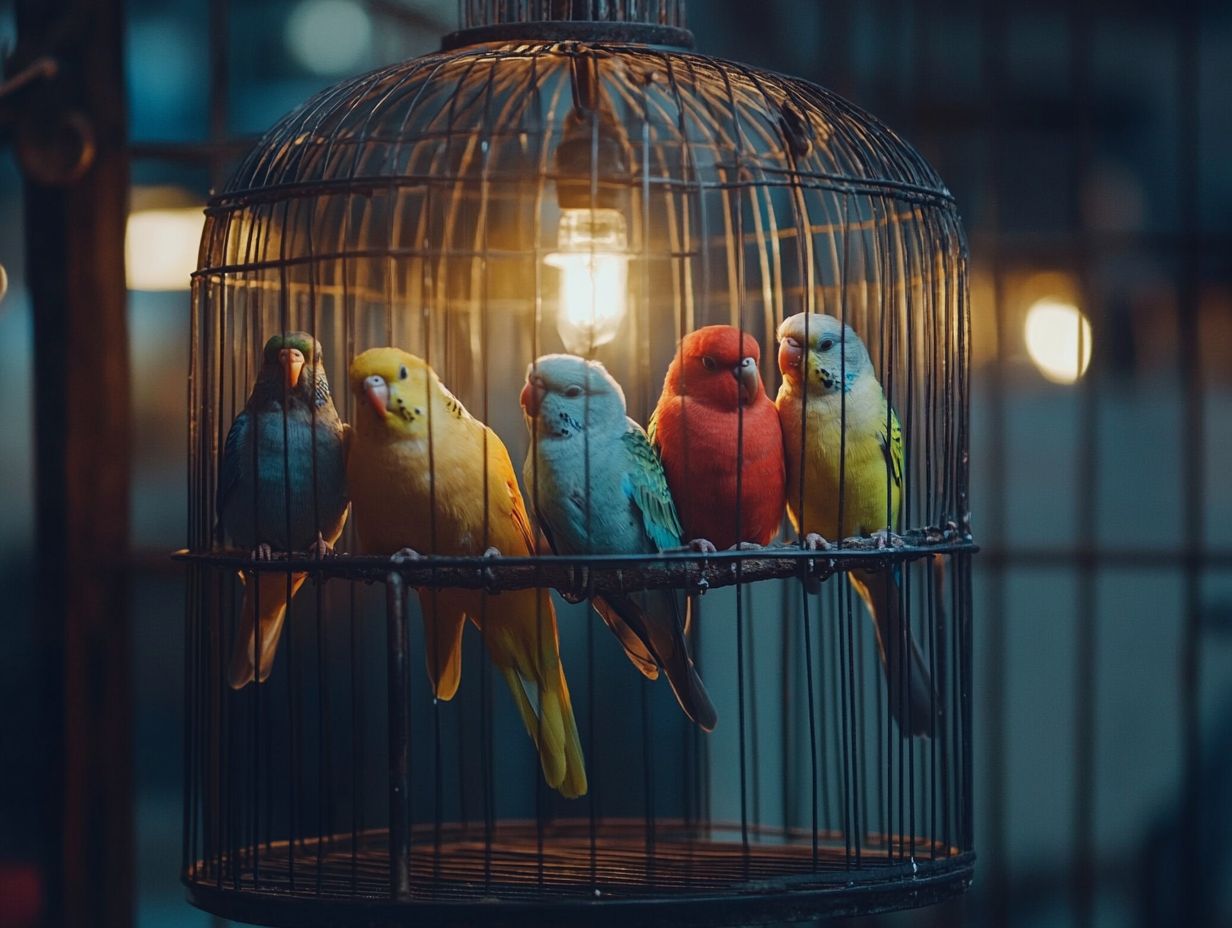
- Pet birds need an average of 10-12 hours of sleep per night to maintain their physical and mental well-being. Act now to ensure your bird’s well-being!
- Factors such as age, species, and daily activities can affect a pet bird’s sleep needs.
- Signs of sleep deprivation in pet birds include excessive napping, irritability, and changes in behavior or feather condition.
By prioritizing your pet birds’ sleep needs, you can ensure they lead happy, healthy lives. Start making changes today!
Signs of Sleep Deprivation in Pet Birds
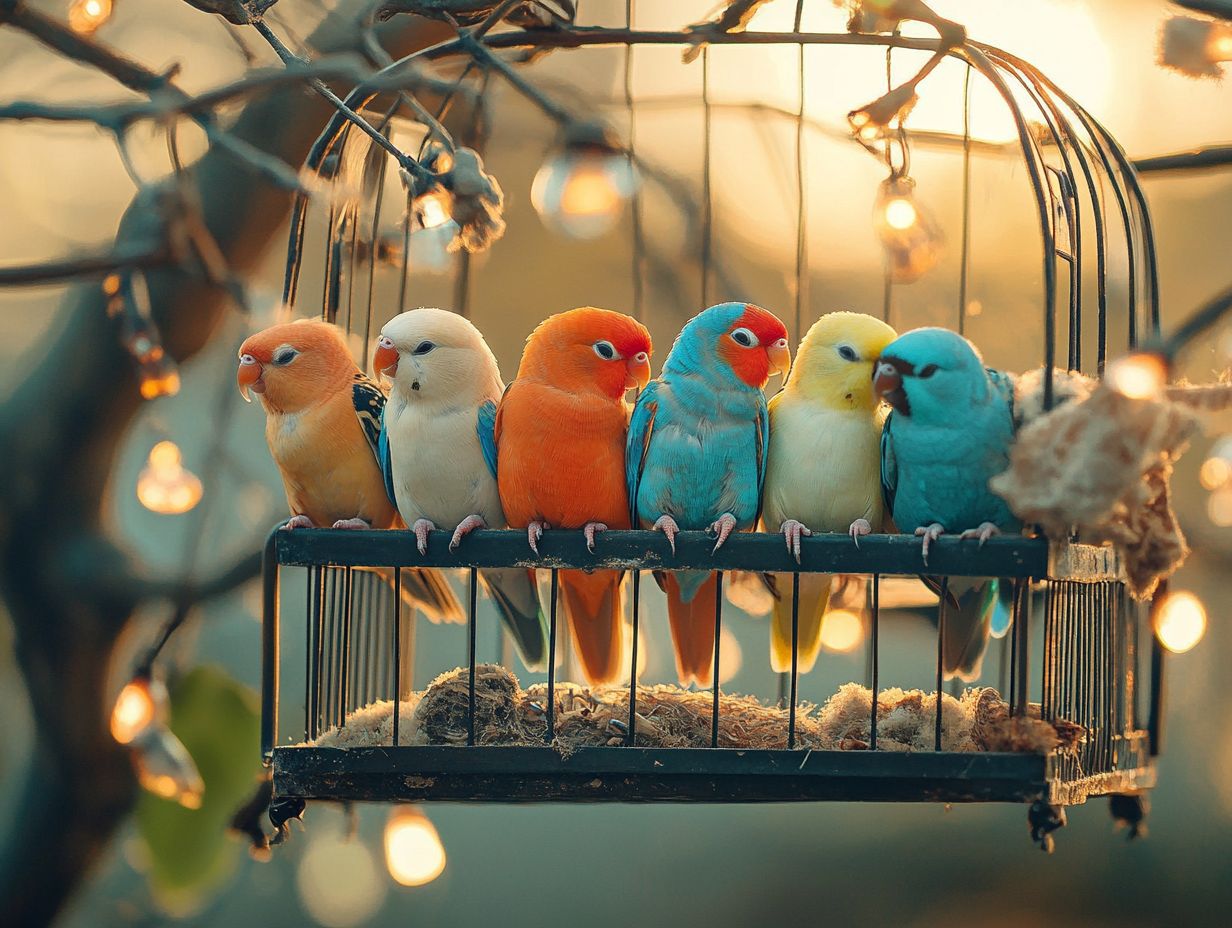
Recognizing the signs of sleep deprivation in your pet birds is crucial for ensuring their health and overall wellbeing. You’ll notice various indicators, ranging from behavioral changes to physical symptoms.
Excessive vocalization, unexpected aggression, or lethargy can all signal that your feathered friend isn’t getting the rest it needs. Sleep-deprived birds may also exhibit feather-damaging behaviors, leading to significant health issues if not addressed.
By understanding these signs, you can make the necessary adjustments to effectively cater to your bird’s sleep needs.
Behavioral and Physical Indicators
Behavioral and physical indicators of sleep deprivation in parrots can manifest in various ways, reflecting your feathered friend’s psychological and physiological state. Common behavioral signs include increased aggression, social withdrawal, or excessive vocalization.
Physically, sleep-deprived birds may exhibit fatigue, ruffled feathers, or an overall unkempt appearance. Spotting these signs is key to keeping your feathered friend happy and healthy!
Watch for changes in your parrot s eating habits or activity levels, as these can signal sleep struggles. A normally playful parrot might become lethargic, choosing to perch quietly rather than engaging with toys or interacting with you. Feather-plucking or other self-destructive behaviors can emerge when birds are chronically sleep-deprived.
When you notice these concerning signs, take immediate action to reevaluate your bird s nighttime environment. Ensure it s dark, quiet, and comfortable to promote the overall well-being and longevity of your beloved companion.
Creating a Suitable Sleeping Environment
Creating an ideal sleeping environment for your pet birds is crucial for ensuring they get the rest they need to thrive. A thoughtfully designed sleeping area should offer sufficient darkness, allowing your parrots to enjoy uninterrupted sleep while minimizing disruptions from light cycles, or the natural changes of light throughout the day.
Selecting the right perches that provide both comfort and security can significantly enhance a bird’s ability to sleep soundly. By adopting best practices for their sleep environments, you reinforce their natural behaviors and contribute to their overall health and well-being.
Best Practices for Pet Bird Sleep
Implementing best practices for your pet bird’s sleep means creating an environment that prioritizes their health and comfort. It’s essential to provide perches that mimic their natural roosting behaviors and to maintain a darkened space during sleep hours. This reduces stress and enhances the quality of their sleep.
Establishing a consistent sleep schedule will help your birds adjust their sleep patterns, further supporting their overall health and wellbeing. Adhering to these practices fosters a more restful and restorative sleeping experience for your feathered friends.
To elevate their sleeping conditions even further, consider the type of lighting you use during the day. Full-spectrum light bulbs can replicate natural sunlight, making it easier for your pet birds to recognize the difference between day and night.
Ensuring that their sleeping area is quiet and free from movement is another key factor in promoting uninterrupted rest. Regularly monitoring temperature and humidity levels in their environment is crucial for their comfort during sleep.
By paying attention to these details, you enhance your birds’ sleep quality and strengthen the bond you share with them, paving the way for a happier and healthier life together.
Common Sleep Problems in Pet Birds
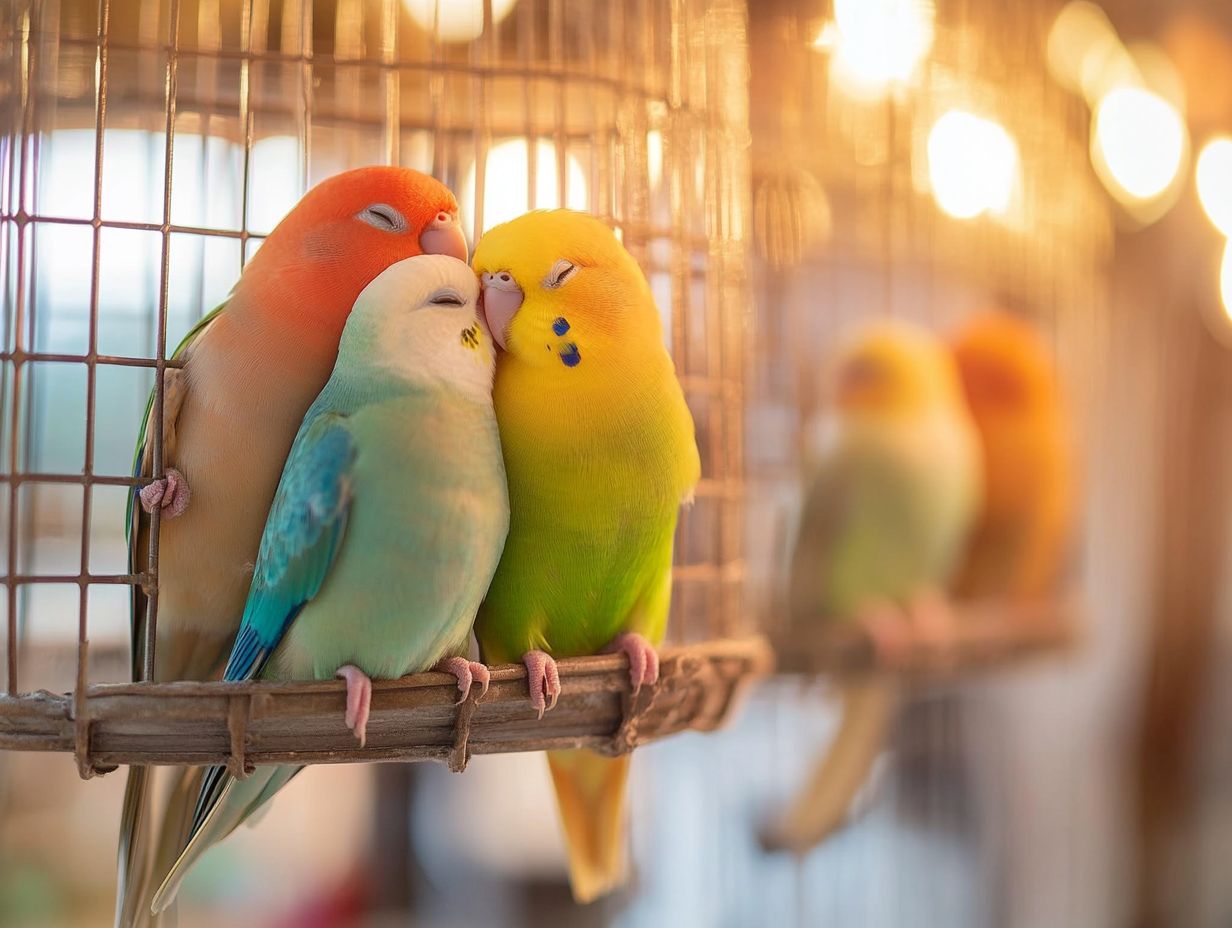
Common sleep problems in your pet birds can arise from various conditions and environmental factors, posing significant risks to their health and happiness. Issues like insufficient sleep duration, disturbances during rest, or unsuitable sleeping environments can lead to heightened stress and behavioral issues.
Spotting these issues early is vital for your bird’s happiness! By understanding these challenges, you can create an ideal sleeping environment for your birds, ensuring they rest easy and thrive.
Identifying and Addressing Issues
Identifying and addressing sleep problems in your pet birds requires a keen eye for their behavior and surroundings. You might notice common signs like increased aggression, changes in vocalization, or signs of fatigue all of which can signal underlying sleep issues.
By actively monitoring these behaviors, you can create a supportive environment that aligns with your birds’ natural instincts. For example, using covered cages (which provide darkness) or designating quiet areas during nighttime can help minimize disruptions and mimic their instinctual roosting habits in the wild.
Establishing a consistent routine for lights out will condition them to anticipate sleep at certain times, promoting stability. Consider enriching your bird’s environment during the day, providing plenty of play and exercise to encourage healthier sleep patterns at night, ensuring they receive adequate hours of uninterrupted rest.
Act now to enhance your bird’s sleep quality and bond! These thoughtful adjustments can make a significant difference.
Frequently Asked Questions
How Much Sleep Do Pet Birds Need?
Pet birds typically need 10 to 12 hours of sleep each night for good health and happiness. Their sleep needs can vary among different species, but this range is crucial for their overall wellbeing.
Do Pet Birds Need to Sleep in Complete Darkness?
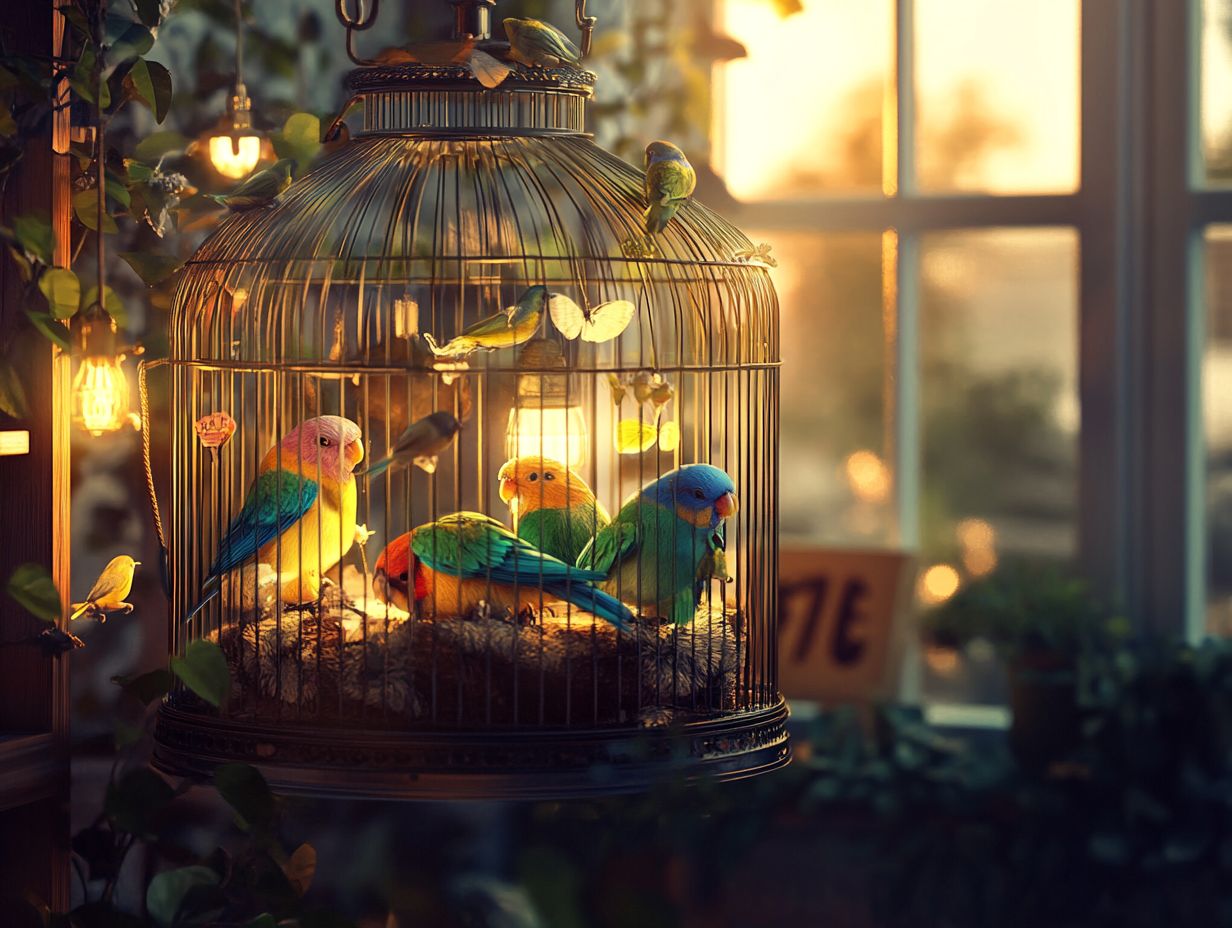
Yes, it’s important for pet birds to have a dark and quiet sleeping environment to mimic their natural sleeping conditions in the wild, especially during periods of darkness when predators are less active.
Can Pet Birds Take Naps During the Day?
Yes, pet birds may take short naps throughout the day, but they still need a solid 10 to 12 hours of uninterrupted sleep at night to fully rest and recharge, which is crucial for their physical and psychological health.
What Happens if Pet Birds Don’t Get Enough Sleep?
If pet birds don’t get enough sleep, they may become irritable, have a weakened immune system, and exhibit abnormal behaviors such as feather damaging or excessive vocalizations, pointing to potential behavioral issues that can arise from insufficient rest.
How Can I Tell if My Bird is Getting Enough Sleep?
Look for signs such as active behavior during the day, a calm demeanor, and regular sleep patterns. Monitoring their activity can help you assess their sleep quality.
Take the time to observe your feathered friends closely. Their happiness depends on it!
Should I cover my pet bird’s cage at night?
Yes, covering your pet bird’s cage at night creates a dark, quiet sleeping environment. This promotes better rest and reduces stress levels, improving their overall health.
How can I tell if my pet bird is getting enough sleep?
If your pet bird is alert, active, and has a healthy appetite during the day, it s likely getting enough sleep at night. However, watch for any changes in behavior or health. If you notice decreased vigilance or signs of stress, consult a veterinarian.

